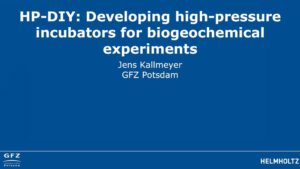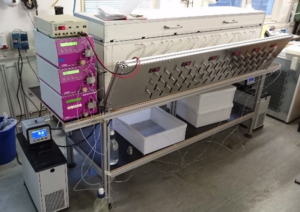Marking the beginning of the MultiKulti Webinar series Jens Kallmeyer of the German Geological Research Center (Geoforschungszentrum, GFZ) held a very interesting talk to the MultiKulti group and several intrigued guests. The topic was ‘HP-DIY: Developing high-pressure incubators for biogeochemical experiments’.
Jens Kallmeyer’s group developed a new kind of reactor providing conditions that are not achievable with commercially available bioreactors. Considering this, their work bears similarities to our objective and we followed the talk with great interest. First we heard that a sandwich that had spent 10 months at high pressure on the sea floor, was still edible (see Jannasch et.al. 1971). Then the speaker introduced us to different versions of high pressure incubators and explained their respective advantages and disadvantages as well as their applications. At the GFZ a high-pressure flow reactor was developed that allows for a saturation of the medium with gas before the incubation (see Sauer et.al. 2012). As high pressures in the environment often go hand in hand with high temperatures, the newly developed high pressure-temperature gradient system allows for simultaneous incubations at 15 different temperatures and three different pressures. The dynamic pressure system dampens pressure fluctuations due to thermic expansion. The MultiKulti engineers were inspired and followed the geochemist’s talk with a lively discussion. The MultiKulti biologists were also very much animated by the presentation and will have a lot to think about the high pressure results of the GFZ group.
Dr. Jens Kallmeyer is head of the Aquatic Geochemistry Laboratory and head of the Radioisotope Laboratory at the GFZ in Potsdam. He is working on the exploration of the deep biosphere, the biogeochemistry of lake sediments and pore waters, lakes as carbon sinks, as well as the determination of microbial biomass and measurement of turnover rates with radioisotopes. We are grateful for the interesting scientific talk and the exchange and hope to stay in contact with our guest on a scientific level, too.
The next scientific talk of the webinar series will take place on the 14th of July 2022 at 4:15 pm and will be held by Jörg Overmann (DSMZ).


